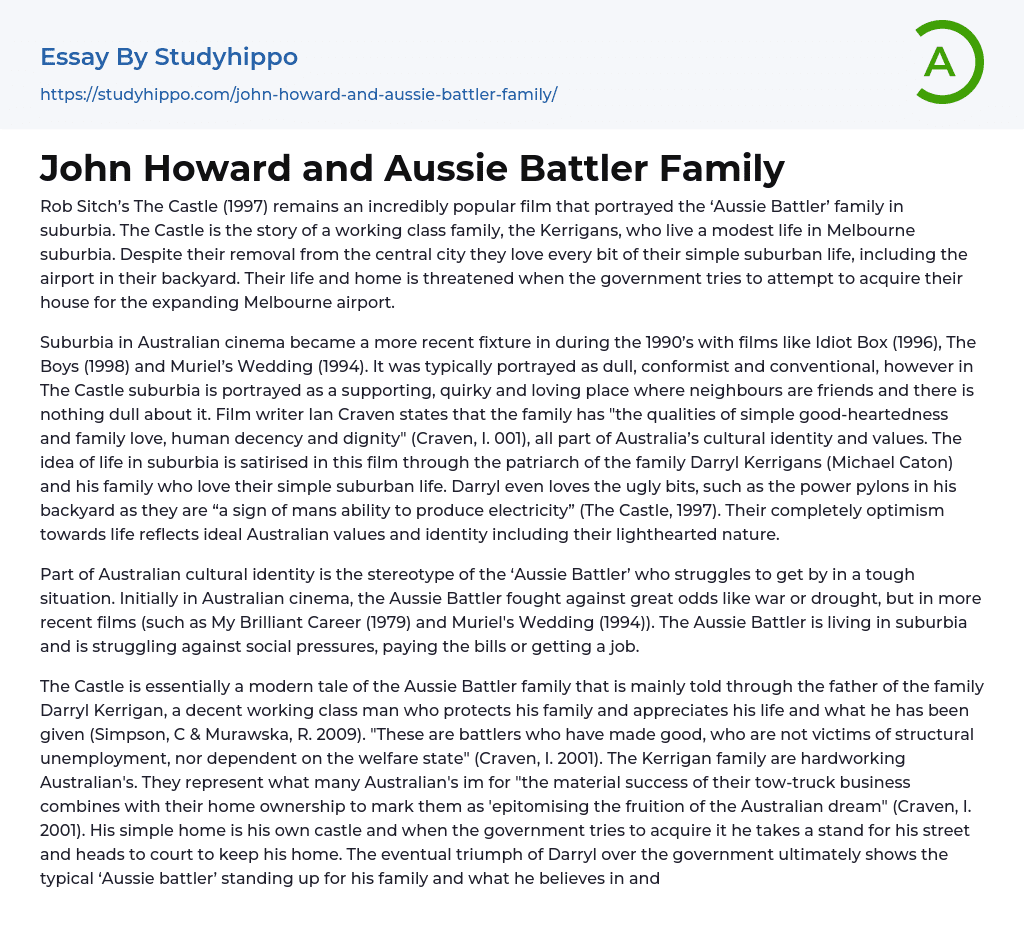Rob Sitch’s The Castle (1997) remains an incredibly popular film that portrayed the ‘Aussie Battler’ family in suburbia. The Castle is the story of a working class family, the Kerrigans, who live a modest life in Melbourne suburbia. Despite their removal from the central city they love every bit of their simple suburban life, including the airport in their backyard. Their life and home is threatened when the government tries to attempt to acquire their house for the expanding Melbourne airport.
Suburbia in Australian cinema became a more recent fixture in during the 1990’s with films like Idiot Box (1996), The Boys (1998) and Muriel’s Wedding (1994). It was typically portrayed as dull, conformist and conventional, however in The Castle suburbia is portrayed as a supporting, quirky and loving place where neighbours are friends and there is nothing dull
...about it. Film writer Ian Craven states that the family has "the qualities of simple good-heartedness and family love, human decency and dignity" (Craven, I. 001), all part of Australia’s cultural identity and values. The idea of life in suburbia is satirised in this film through the patriarch of the family Darryl Kerrigans (Michael Caton) and his family who love their simple suburban life. Darryl even loves the ugly bits, such as the power pylons in his backyard as they are “a sign of mans ability to produce electricity” (The Castle, 1997). Their completely optimism towards life reflects ideal Australian values and identity including their lighthearted nature.
Part of Australian cultural identity is the stereotype of the ‘Aussie Battler’ who struggles to get by in a tough situation. Initially in Australian cinema, the Aussie Battler fought against grea
odds like war or drought, but in more recent films (such as My Brilliant Career (1979) and Muriel's Wedding (1994)). The Aussie Battler is living in suburbia and is struggling against social pressures, paying the bills or getting a job.
The Castle is essentially a modern tale of the Aussie Battler family that is mainly told through the father of the family Darryl Kerrigan, a decent working class man who protects his family and appreciates his life and what he has been given (Simpson, C & Murawska, R. 2009). "These are battlers who have made good, who are not victims of structural unemployment, nor dependent on the welfare state" (Craven, I. 2001). The Kerrigan family are hardworking Australian's. They represent what many Australian's im for "the material success of their tow-truck business combines with their home ownership to mark them as 'epitomising the fruition of the Australian dream" (Craven, I. 2001). His simple home is his own castle and when the government tries to acquire it he takes a stand for his street and heads to court to keep his home. The eventual triumph of Darryl over the government ultimately shows the typical ‘Aussie battler’ standing up for his family and what he believes in and ultimately winning.
- Australian Culture essays
- Home essays
- Dog essays
- Adoption essays
- Babies essays
- Children essays
- Love essays
- Parenting Teens essays
- Wedding essays
- Wife essays
- Aunt essays
- Daughter essays
- Parents essays
- Sister essays
- Foster Care essays
- Sibling essays
- Father essays
- Grandparent essays
- Mother essays
- Caring essays
- Dysfunctional Family essays
- Bedroom essays
- Room essays
- Relationship essays
- Jealousy essays
- Friends essays
- Online Dating essays
- Divorce essays
- Husband essays
- Marriage essays
- Hometown essays
- Parenting essays
- Family Tradition essays
- Family Values essays
- Baby Clothes essays
- Child essays
- Childcare essays
- Child labor essays
- Doll essays
- Walls essays
- Appreciation essays
- Single Parent essays
- Single Parenting essays
- Afghanistan essays
- Africa essays
- America essays
- Asia essays
- Australia essays
- Caribbean essays
- City essays




